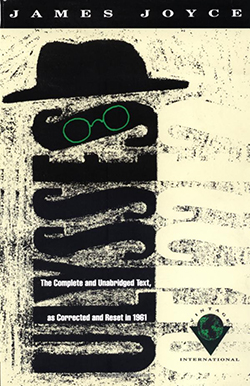I have always been interested in the great books and have read many of them, but Ulysses has always remained in my mind as the most challenging so I had not attempted reading it. I decided to give it a try and obtained a copy of the left pictured edition from the Cambria Library on October 20th. Last night I finished it. I had no idea how humorous, interesting, and approachable it would be.
Here are quotes from the Wikipedia entry for the novel:
“Ulysses’ stream-of-consciousness technique, careful structuring, and experimental prose—full of puns, parodies, and allusions, as well as its rich characterisations and broad humour, made the book a highly regarded novel in the Modernist pantheon. In 1999, the Modern Library ranked Ulysses first on its list of the 100 best English-language novels of the 20th century.”
“Episode 17, Ithaca
The episode is written in the form of a rigidly organized catechism, and was reportedly Joyce’s favourite episode in the novel. The style is that of a scientific inquiry, with questions furthering the narrative. The deep descriptions range from questions of astronomy to the trajectory of urination.”
The technique he used in chapter 17 is certainly a favorite of mine. Here is one fun section:
“What relation existed between their ages?
16 years before in 1888 when Bloom was of Stephen’s present age Stephen was 6. 16 years after in 1920 when Stephen would be of Bloom’s present age Bloom would be 54. In 1936 when Bloom would be 70 and Stephen 54 their ages initially in the ratio of 16 to 0 would be as 17 1/2 to 13 1/2, the proportion increasing and the disparity diminishing according as arbitrary future years were added, for if the proportion existing in 1883 had continued immutable, conceiving that to be possible, till then 1904 when Stephen was 22 Bloom would be 374 and in 1920 when Stephen would be 38, as Bloom then was, Bloom would be 646 while in 1952 when Stephen would have attained the maximum postdiluvian age of 70 Bloom, being 1190 years alive having been born in the year 714, would have surpassed by 221 years the maximum antediluvian age, that of Methusalah, 969 years, while, if Stephen would continue to live until he would attain that age in the year 3072 A.D., Bloom would have been obliged to have been alive 83,300 years, having been obliged to have been born in the year 81,396 B.C.
What events might nullify these calculations?
The cessation of existence of both or either, the inauguration of a new era or calendar, the annihilation of the world and consequent extermination of the human species, inevitable but impredictable.”
I would love to take a class on the novel and reread it therein.
2 Responses to “James Joyce’s Ulysses”
Sorry, the comment form is closed at this time.

You are a better man than I. I started it a few times, but never finished. Apparently there is all kinds of symbolism and stuff throughout. Lots of layers of interpretations. Ever heard about the 24 hour readings they have of this book?
In 1968, my then husband and I read this book and from it we gleaned our son, Japhet’s name. I think it was Japheth, but we shortened it by removing the “H.” I believe it said, “Japheth would inherit the earth.” Or something like that.